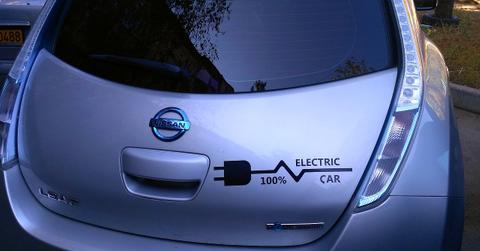Nissan Uses Electric Cars To Aid Disaster Relief In Pilot Program
On top of announcing the new LEAF, Nissan will work on three pilot projects under a new sustainable program that will focus on providing battery solutions in developing countries, high-risk areas for natural disaster, and communities around Europe.
Updated May 25 2019, 5:43 a.m. ET
Along with releasing information on the new Nissan LEAF, the car manufacturer is pushing out a series of pilot projects to showcase just how useful the electric vehicle battery is. Under the umbrella of the new Nissan Electric Ecosystem, the company plans to provide battery solutions to developing countries, aid in high-risk disaster areas, and expand outreach to communities in Europe.
The first project deals with building a small grid system for developing countries. We’ve seen numerous solar-powered systems and vehicles being released at affordable rates for those in rural areas that struggle to get any electricity, clean water, and food for their family. Adding local battery supply would limit these travel times and communities would be able to thrive with better shops and schools.
In Europe itself, local communities would also receive the Nissan Electric Ecosystem benefits. There would be more opportunities for consumers to give electricity back to the grid and save on their energy costs. Some Nissan LEAFs would be optimized for car-sharing services. The company will also install more solar-powered solutions in residential areas along with the xStorage, which is very similar to Tesla’s Solar Roof and Powerwall package.
A third and final project Nissan will be deploying is creating relationships with organizations where natural disasters are a high risk. To be more prepared for future hurricanes and the flooding it causes, certain vehicle models will feature battery packs that work as a significant battery backup. This would create a source of energy for relief aid when power is down, like what Puerto Rico is facing after Hurricane Maria pushed through the island.
All of these projects were announced with the unveiling of the new Nissan LEAF at the Nissan Futures 3.0 event in Oslo, Norway. The vehicle is optimized for many of these projects, such as bi-directional charging for vehicle-to-grid networking and features PrioPILOT driver assistance technology. Range is listed at 235 miles on a single charge of the 40 kilowatt-hour lithium-ion battery.
“With a rapidly rising, urbanising global population, problems like access to energy, climate change, and poor air quality all risk getting worse rather than better,” Gareth Dunsmore, Electric Vehicle Director at Nissan Europe, said in a statement. “We’ve been asking ourselves: How can we use our global reach and history of innovation, to help build a brighter, electric future for everyone. What better place to start than by bringing power and mobility to people in a sustainable and equitable way?”
Nissan prides itself in their battery storage solutions. They’re able to easily link together, creating customizable energy capacity. These batteries are also lighter and have the ability to store loads of electricity. When it comes to manufacturing it at large scale, the company has created over 300,000 of them and there have been no failures. Finally, when the battery goes through its lifecycle, over 99 percent of it can be recycled.
